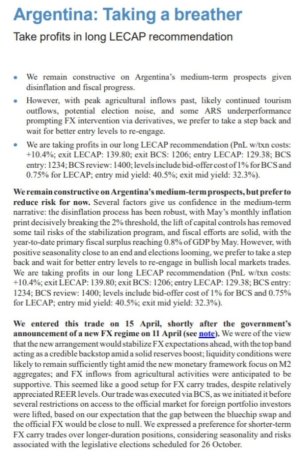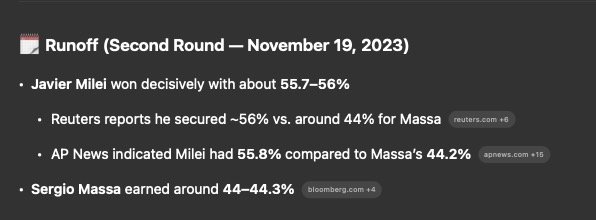earlyretirement
Moderator
JP Morgan takes BuySellBA's recommendation to Exit Carry Trade Positions in Argentina
As we posted a few weeks ago, you will see BIG MONEY start exiting carry trade positions before the October mid-term election. It's happening even sooner than we thought.
JP Morgan delivers a notably cautious and critical assessment of Argentina's current economic strategy under President Javier Milei and Economy Minister Luis Caputo.
⛔️Recommendation to Reduce Exposure: J.P. Morgan advises investors to step back from Argentine assets, specifically recommending an exit from the popular "carry trade" (short-term investments in peso-denominated instruments like LECAPs), due to rising risks associated with the country's economic program and currency policy.
⛔️Concerns Over Currency Sustainability: The report is sharply critical of the government's policy of maintaining a "cheap dollar" (an overvalued peso), warning that this approach is unsustainable and likely to trigger a currency crisis. The bank notes that the artificially strong peso, supported by debt, is already leading to significant capital outflows, especially through tourism, and predicts further pressure on reserves during the winter holiday season.
⛔️Political and Electoral Risks: J.P. Morgan highlights "electoral noise" as a significant risk factor ahead of the October legislative elections, suggesting that political uncertainty could further destabilize the economy and markets.
⛔️Peak in Agricultural Dollar Inflows: The report points out that the current period coincides with the seasonal peak of agricultural export dollar inflows. However, it warns that these inflows will drop sharply by mid-July, potentially exacerbating the country's foreign currency shortage.
⛔️Mixed Medium-Term View: While acknowledging some positive developments—such as robust disinflation, the lifting of capital controls, and fiscal discipline—the bank ultimately prefers to "wait and see" before increasing exposure, citing ongoing risks and the lack of confidence in the sustainability of the current stabilization program.
⛔️Record Country Risk: Despite some reforms and the end of capital controls, Argentina's country risk premium remains exceptionally high (over 700 basis points), reflecting persistent investor skepticism.
⛔️Recent Financial Operations: Argentina has recently engaged in a $2 billion repo agreement with several international banks, including J.P. Morgan, to bolster central bank reserves, highlighting ongoing liquidity concerns.
⛔️Potential for Future Inflows: J.P. Morgan has also noted that a potential reclassification of Argentina by MSCI could trigger up to $1 billion in capital inflows, but this is contingent on further macroeconomic stabilization and the easing of capital controls, which is not expected imminently.
📣 - When BuySellBA talks, ALL the Big Money Listens

As we posted a few weeks ago, you will see BIG MONEY start exiting carry trade positions before the October mid-term election. It's happening even sooner than we thought.
JP Morgan delivers a notably cautious and critical assessment of Argentina's current economic strategy under President Javier Milei and Economy Minister Luis Caputo.
⛔️Recommendation to Reduce Exposure: J.P. Morgan advises investors to step back from Argentine assets, specifically recommending an exit from the popular "carry trade" (short-term investments in peso-denominated instruments like LECAPs), due to rising risks associated with the country's economic program and currency policy.
⛔️Concerns Over Currency Sustainability: The report is sharply critical of the government's policy of maintaining a "cheap dollar" (an overvalued peso), warning that this approach is unsustainable and likely to trigger a currency crisis. The bank notes that the artificially strong peso, supported by debt, is already leading to significant capital outflows, especially through tourism, and predicts further pressure on reserves during the winter holiday season.
⛔️Political and Electoral Risks: J.P. Morgan highlights "electoral noise" as a significant risk factor ahead of the October legislative elections, suggesting that political uncertainty could further destabilize the economy and markets.
⛔️Peak in Agricultural Dollar Inflows: The report points out that the current period coincides with the seasonal peak of agricultural export dollar inflows. However, it warns that these inflows will drop sharply by mid-July, potentially exacerbating the country's foreign currency shortage.
⛔️Mixed Medium-Term View: While acknowledging some positive developments—such as robust disinflation, the lifting of capital controls, and fiscal discipline—the bank ultimately prefers to "wait and see" before increasing exposure, citing ongoing risks and the lack of confidence in the sustainability of the current stabilization program.
⛔️Record Country Risk: Despite some reforms and the end of capital controls, Argentina's country risk premium remains exceptionally high (over 700 basis points), reflecting persistent investor skepticism.
⛔️Recent Financial Operations: Argentina has recently engaged in a $2 billion repo agreement with several international banks, including J.P. Morgan, to bolster central bank reserves, highlighting ongoing liquidity concerns.
⛔️Potential for Future Inflows: J.P. Morgan has also noted that a potential reclassification of Argentina by MSCI could trigger up to $1 billion in capital inflows, but this is contingent on further macroeconomic stabilization and the easing of capital controls, which is not expected imminently.
📣 - When BuySellBA talks, ALL the Big Money Listens






